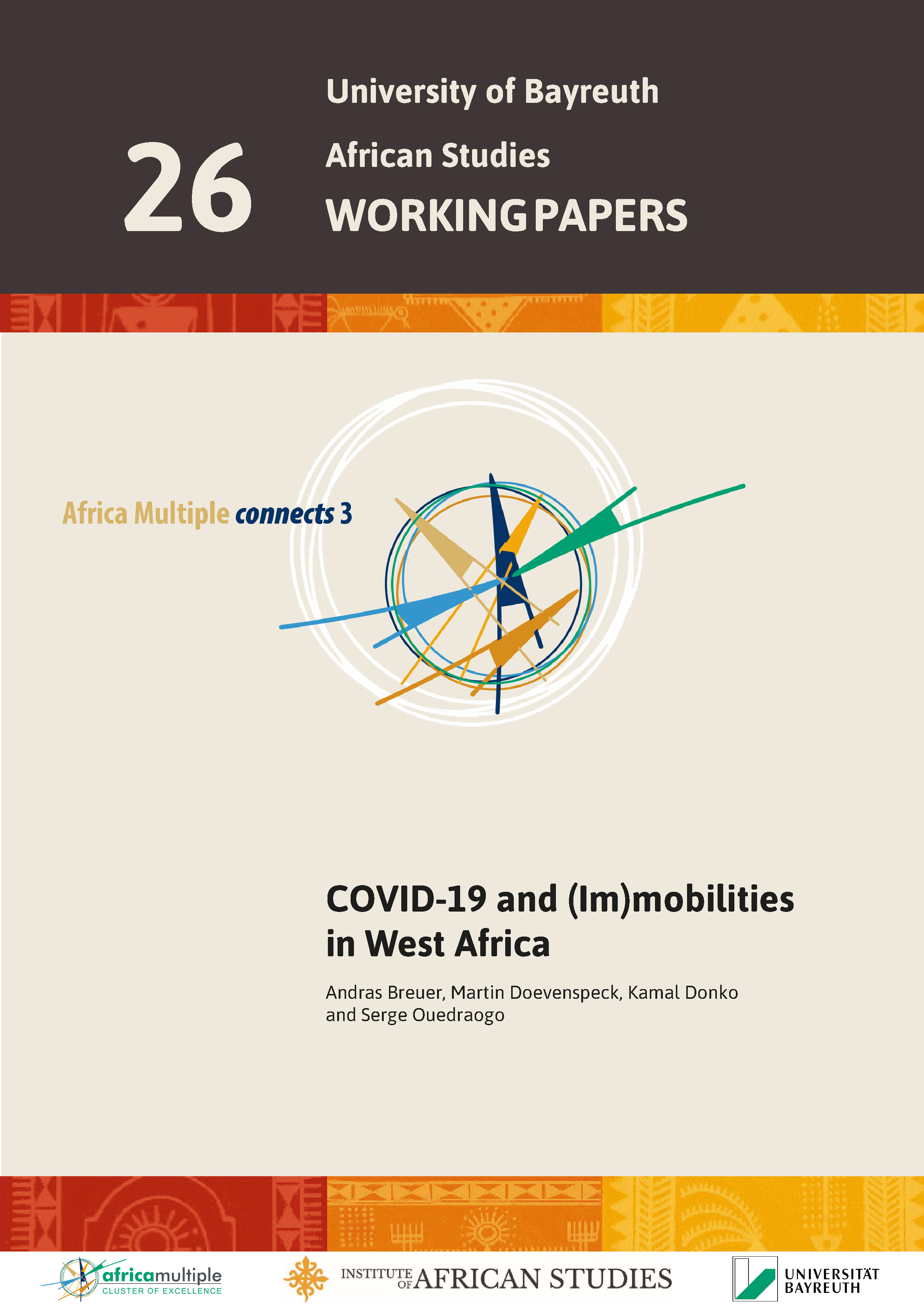News
Cluster publishes Africa Multiple connects 3: COVID-19 and (Im)mobilities in West Africa
06.07.2021
The Working Paper Series of the Africa Multiple Cluster of Excellence “Africa Multiple connects” has just published another edition to its series. The latest publication summarizes the findings of a study on COVID-19 and (im)mobilities in West Africa.
An international research team comprising Andreas Breuer, Martin Doevenspeck, Kamal Donko and Serge Ouedraogo studied the links between COVID 19 and mobility pattern in West Africa. Now they have published their findings as part of the Africa Multiple Cluster of Excellence’s publication series Africa Multiple connects.
COVID-19 and (im)mobilities in West Africa
The study “COVID-19 and (im)mobilities in West Africa” examines recent developments of mobility patterns in West Africa within the context of the ongoing COVID-19 pandemic. During the course of the study, a broad understanding of mobilities was applied to account for mobilities of people, goods as well as capital. The researchers’ aim was to track changes in mobility patterns caused by the pandemic and by institutional responses to the latter. The study may herein serve to encourage more in-depth and comprehensive studies of the new (im)mobilities and the regimes that shape them.
Embedding the subject of mobility changes into the political-economic framework of the networks of global capitalism and taking a perspective on the formative regimes, the research team developed first suppositions on how to apply the concept of (im)mobility regimes to assess the newly manifested (im)mobilisations. To shed light on the bigger picture of recent developments in Western Africa, this study tackles a wide range of mobility-related topics. At first, the epidemiological situation as well as the local testing regimes were analysed in order to assess the extent to which the pandemic is scientifically captured in Western Africa in contrast to other regions. By then providing a systematic outline of the lockdown policies of the individual ECOWAS member states, a first approach to the formative regimes can be given. In this study, the manifested new (im)mobilities of people are evaluated with a focus on public transport, migratory movements and public air travel. Additionally, the (im)mobilities of goods are discussed with a special focus on maritime freight mobilities. Finally, (im)mobilities of capital are dealt with in order to address changes and constants in the context of COVID-19, for example in the realm of remittances. Overall, this provides a first basis for a multi-dimensional understanding of the emerging phenomena in the ECOWAS region.
Africa Multiple connects
As the Working Paper Series of the Africa Multiple Cluster of Excellence, Africa Multiple connects offers a forum for research conducted and presented by researchers affiliated to the Cluster. The series also accommodates papers such as invited lectures, workshop contributions, or conference papers submitted by the Cluster’s guests and visiting scholars.
Africa Multiple connects complements the existing Working Paper sub-series published under the umbrella of the University of Bayreuth African Studies Working Papers: Academy reflects – a sub-series featuring research by fellows and postdoc working groups of the Bayreuth Academy of Advanced African Studies, which is now part of the Africa Multiple Cluster of Excellence – and BIGSASworks!, the platform for publishing research-related articles and edited volumes by Junior Fellows of the Bayreuth International Graduate School of African Studies (BIGSAS).
In October 2019, Africa Multiple connects issued its first edition titled “Figuring out how to reconfigure African Studies” by Cluster Dean Prof. Dr. Rüdiger Seesemann. Managing editor of the series Africa Multiple connects is Dr. Doris Löhr.
Breuer, Andras; Doevenspeck, Martin; Donko, Kamal; Ouedraogo, Serge:
COVID-19 and (Im)mobilities in West Africa. Hrsg.: Maurus, Sabrina. Bayreuth, Germany: Institute of African Studies, 2021. - XIV, 153 S. - (University of Bayreuth African Studies Working Papers; 26) (Africa Multiple connects; 3)


